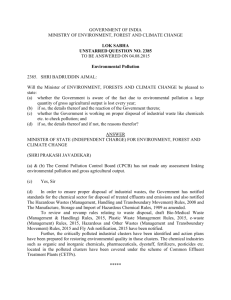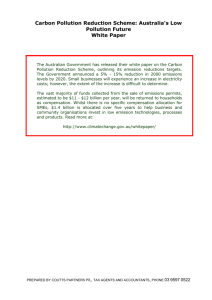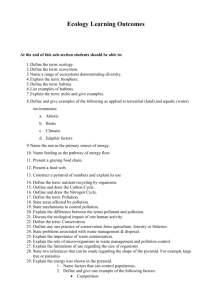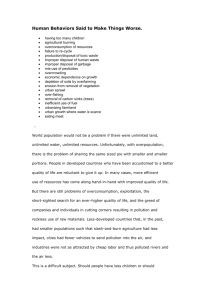Fundamentals of Environmental Engg
advertisement
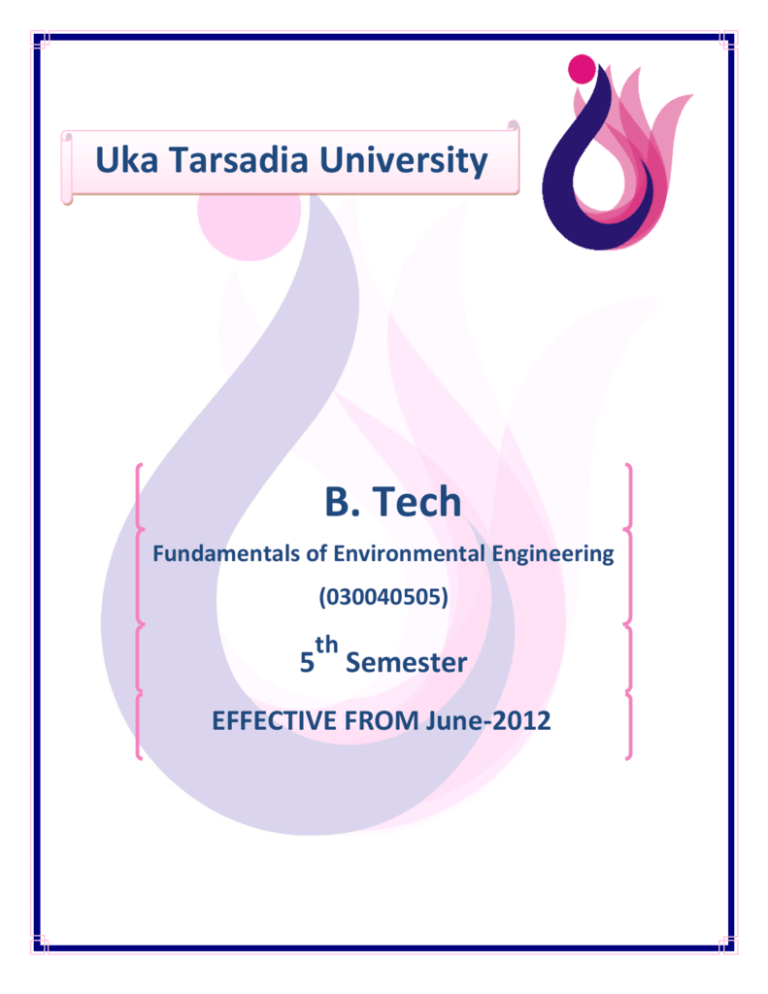
Uka Tarsadia University B. Tech Fundamentals of Environmental Engineering (030040505) th 5 Semester EFFECTIVE FROM June-2012 Uka Tarsadia University A. Prerequisite: B. Aim and Objective: Fundamentals of Civil Engineering and Environmental Studies To study the concepts of environmental engineering and the effect of technological advances on the environment C. Subject Code: 030040505 Subject : Fundamentals of Environmental Engineering D. Total: 65 Hrs. [Lecture: 3 Tutorial: 0 Practical: 2] E. Detailed Syllabus: Sr. No. 1. 1.1 Weightage (%) Topic Name Introduction Scope and importance of environmental engineering and management Components of environment, types of microbes, growth and their role in environment. Demand and sources of water Water demand, population forecast, water quantity graph analysis and Sources of water, drinking water standards, Requirements and impurities. 10 3. Characteristics of water and waste water 35 3.1 Physical, chemical and biological characteristics: Ph, turbidity, solids, alkalinity, hardness, chlorides, COD, BOD etc Industrial waste water: Indian standard for effluent disposal and receiving water body, typical industry Characteristics, disposal of treated wastewater. Effect of organic pollution on river water quality, self purification. DO sag curve. 1.2 2. 2.1 2.2 3.2 4. Pollution 4.1 Introduction to environmental pollution, types of pollution, air pollution: definition, classification, sources, composition of atmospheric air, effects of air pollution, air pollution control method. Noise pollution: definition, measurement, sources, effects and control. 5. 5.1 Solid waste management Quantity, composition and Characteristics, collection, conveyance, treatment and disposal House drainage 6. methods of 15 20 12 10 18 10 Uka Tarsadia University 6.1 Principles of house drainage, pipes and traps, classification of traps: nanhi trap, gully trap, interception trap, grease trap. Sanitary fitting and house drainage plan. F. Modes of Transaction (i.e. Delivery) 1. Lectures /discussion method shall be fruitful. It should be supplemented with various appropriate audio-visual aids. 2. Activity assignment or presentation shall be given to students. G. Teachers Activities/Practicum The following activities should be carried out by the teachers: 1. Demonstration of various laboratory experiments 2. Conduction of presentation for the practical approach H. Student Activities/Practicum The following activities may be carried out by the students: 1. Study and analysis of characteristics of water and waste water I. Text Books 1. Water supply engineering by B.C. Punmia 2. Waste Water Engineering by B.C. Punmia J. Reference Books 1. A.P. Sincero and G.A. Sincero, Environmental Engineering, Prentice Hall of India, New Delhi. 2. G. Tchabanoglous, Solid Waste Treatment and Disposal, McGraw Hill Pub. 3. G.S. Birdie and J.S. Birdie, Water Supply and Sanitary Engineering, Dhanpat Rai Publishing Co. New Delhi. 4. H.C. Parkins, Air Pollution, McGraw-Hill Pub. 5. H.S. Peavy, D.R. Rowe and G. Tchbanoglous, Environmental Engineering, McGraw Hill International Edition. 6. J.A. Salvato, Environmental Sanitation, Wiley Interscience 7. L.W. Canter, Environmental Impact Assessment, McGraw Hill Pub. 8. M.L. Davis and D.A. Cornwell, Introduction to Environmental Engineering, McGraw Hill International edition 9. Metcalf and Eddy (Revised by G. Tchobanoglous Wastewater Engineering: Treatment, disposal Reuse, Tata-McGraw Hill, New Delhi



